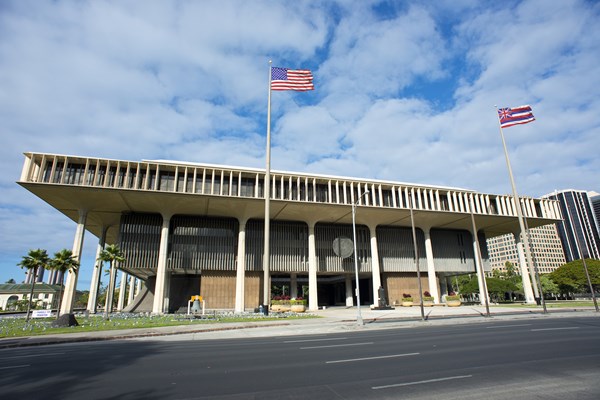2022 legislation advances vital sustainability initiatives
Feb 25, 2022

Robust discussion continues at the State Capitol building on multiple bills aimed at elevating Hawaii's sustainability, self-sufficiency and resilience.
Since the start of the 2022 legislative session on Jan. 19, lawmakers have introduced 2,546 bills, with multiple measures addressing local food production, renewable energy, and clean ground transportation. Following last week’s First Lateral filing deadline, any bills with more than one committee referral must have moved to their final committee in the originating chamber to have a chance at passage. Read on as we highlight several priority bills that continue to move forward.
LOCAL FOOD PRODUCTION
Strengthening farm-to-state efforts
House Bill 1568 HD2 clarifies existing law around farm-to-state initiatives to more directly focus on the State of Hawaii institutions with the highest quantity of food purchases, leveraging their significant power to buy local. Current law requires all State of Hawaii institutions to reach a percentage threshold of locally grown, fresh or local value-added, processed, agricultural or food products. However, with amendments this bill introduces, the food-purchases target would focus on the State of Hawaii Departments of Education, Health, Defense, and Public Safety, as well as the University of Hawaii System. The bill also requires each to report to the Legislature its ongoing progress toward meeting these benchmarks.
House Bill 1864 HD1 and House Bill 2304 HD1 work in conjunction with House Bill 1568 to ensure the Hawaii State Department of Education meets food-purchasing goals set for it. Both measures appropriate funds to the department for additional resources to help implement the Hawaii farm-to-school program aimed at serving students fresher, locally grown foods.
Directly supporting local food producers
Senate Bill 2992 supports farmers challenged by the high costs of operating their businesses and effects of the COVID-19 pandemic. The bill establishes an agriculture investment special fund to support local agricultural producers. As defined in the bill, the special fund may be utilized for awarding grants to farmers, acquiring land for agricultural development, improving farming infrastructure, and other general uses aligning with the State of Hawaii’s commitment to local agriculture production.
Investing in agriculture infrastructure
House Bill 1710 HD1 appropriates funds to the State of Hawaii Department of Agriculture (HDOA) for water-source infrastructure and the maintenance and improvement of Kauai’s Peekauai Ditch Irrigation System, also known as Menehune Ditch. (Read Hawaii’s Water Irrigation Systems Are Priority Infrastructure, a column by Ulupono’s Jesse Cooke, published Nov. 19, 2021, in Honolulu Civil Beat.)
Senate Bill 1025 and Senate Bill 2947 authorize HDOA to manage infrastructure on land under its jurisdiction to support and promote agriculture. The bills also establish the Agricultural Enterprise Program, which provides valuable resources to local farmers on department lands.
Senate Bill 3198 appropriates funds for capital improvement projects for agriculture.
Senate Bill 2218 establishes a five-year food-hub pilot program through HDOA to increase community access to local food. Qualified applicants would be able to receive grant funding to create or expand their own food hubs. The bill also authorizes the issuance of general obligation bonds for the Honalo Processing and Marshalling facility, operated by the Kona Producers Cooperative.
RENEWABLE ENERGY
Redefining how progress is measured in service to Hawaii’s energy goals
House Bill 2089 HD1 amends the definition of the renewable portfolio standard, changing it to the percentage of electrical energy generation rather than defining it by sales. By redefining the renewable portfolio standard, the State of Hawaii can more accurately measure progress toward reaching its stated energy goals. Under the current definition, the continued use of fossil fuel in significant amounts is allowed even after reaching Hawaii’s 2045 100% renewable-energy target.
Establishing green tax programs to combat climate change
House Bill 2278 HD1 establishes a carbon cashback for taxpayers and amends the environmental response, energy, and food security tax to address carbon dioxide emissions. To avoid the worst impacts of climate change, significant reductions in greenhouse gas emissions are necessary. A recent report from the Intergovernmental Panel on Climate Change found that by 2030 carbon dioxide emissions would need to fall by about 45% from 2010 levels to limit global warming to 1.5 degrees Celsius. In advocating a carbon cashback program, legislators are proposing a potentially effective tool aimed at helping reduce greenhouse gas emissions while not financially burdening most households.
CLEAN TRANSPORTATION
Removing barriers to electric vehicles and ensuring equitable access to their benefits
Companion bills House Bill 1811 HD2 and Senate Bill 2720 SD1 provide added flexibility in the implementation of an electric vehicle (EV) charging station rebate program.
House Bill 2090 HD2 establishes a zero-emission transportation rebate program within the State of Hawaii Public Utilities Commission to provide low- and moderate-income families greater access to zero-emission vehicles by providing a rebate on the point-of-sale purchase price.
Demanding focus and adequate resources for multimodal options
Senate Bill 2834 SD1 establishes a transportation improvement and modernization council to monitor HDOT’s mobility efforts and help ensure that the State of Hawaii’s goals and outcomes are met while improving reporting to provide better transparency for elected leaders and the public.
Senate Bill 3274 SD1 requires the State of Hawaii Department of Transportation to increase funding, pursue grants, and work on projects focusing on safe, low user cost pedestrian and bicycle infrastructure.

